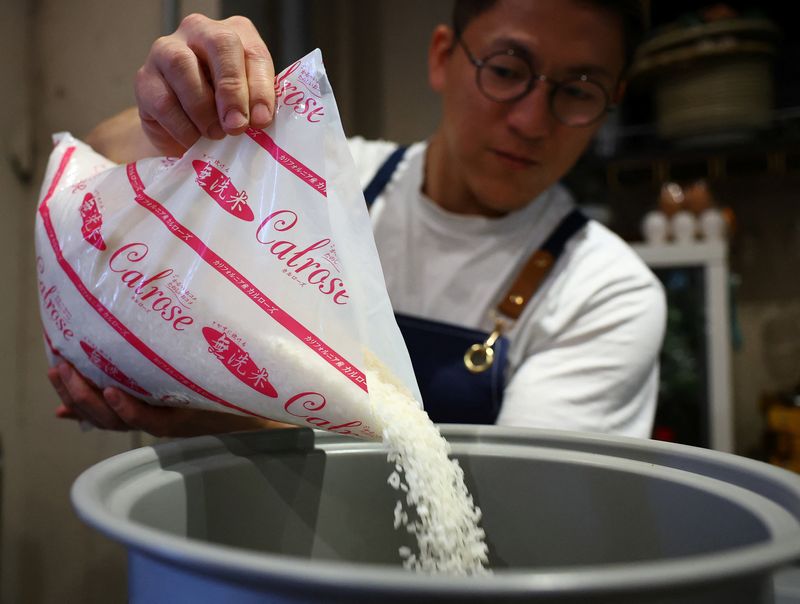By Kaori Kaneko and Chang-Ran Kim
TOKYO (Reuters) – When a severe rice shortage sent prices skyrocketing in Japan last year, Tokyo restaurant owner Arata Hirano did what had once seemed unthinkable: he switched to an American variety.
The price of the Californian Calrose rice he buys has doubled since his first purchase last summer, but even so it’s far cheaper than home-grown grains.
“Unless domestic prices fall below Calrose prices, I don’t plan to switch back,” said Hirano, whose restaurant offers meal sets of fish, rice, soup and sides.
His willingness to embrace foreign rice may presage a seismic change in mindset for Japanese businesses and consumers – one that could allow Tokyo leeway to relax some restrictions if rice becomes a thorny topic in tariff talks with U.S. President Donald Trump, who has called out Japan’s high levies on its staple grain.
Wholesale prices for domestic rice have surged about 70% over the past year to hit their highest levels since current records began in 2006. Crops were hit by extreme heat while a tourism boom has added to demand. Worries abound that not much will change this year.
With inflation also raising the cost of living, businesses are now betting that a nation of people known for their discerning palates and pride in their staple grain is open to change.
Supermarket giant Aeon last week began selling an 80-20 American-Japanese blend that’s about 10% cheaper than domestic rice after a test sales-run proved a hit. Fast-food chain Matsuya and restaurant operator Colowide began serving pure American rice this year. At supermarket chain Seiyu, Taiwanese rice has been flying off the shelves since last year.
It’s a sharp contrast to 1993, when the Thai rice the Japanese government imported during an acute shortage was largely shunned, leaving supermarkets with piles of unsold bags.
Rare shortages aside, for most of the past six decades, nearly all of Japan’s so-called staple rice – which is consumed at meals as opposed to rice used for feed or ingredients in other products – has been home-grown. There hasn’t been much need for imports while high tariffs, put in place to ensure Japanese self-sufficiency for its most basic food, have protected local farmers from competition.
Japan limits tariff-free “minimum access” imports of staple rice to 100,000 metric tons a year, or around 1% of total consumption. The U.S. accounted for roughly 60% of that amount last fiscal year, trailed by Australia, Thailand and Taiwan. Anything above that is subject to a levy of 341 yen per kilogramme.
When Trump announced sweeping tariffs on much of the world this month, he lambasted Japan for what he said was a 700% tariff on rice, a reference to that levy. Japanese policymakers called his remarks on the sensitive topic “regrettable”. They also dispute the 700% figure, saying it’s based on outdated international rice prices.
It’s unclear, however, just how much – if at all – rice will be discussed in bilateral tariff negotiations that began this week. Some analysts think Trump’s Republican administration might not be focused on rice as exports to Japan come from California, a Democratic-leaning state. Nor is it clear how much Japan might be willing to yield in opening up its rice market.
In one sign that there might be room for some change, a panel advising the finance ministry on Tuesday proposed expanding imports of staple rice, saying that lifting the 100,000-ton tariff-free cap could help stabilise supply.
That said, Prime Minister Shigeru Ishiba’s Liberal Democratic Party is unlikely to risk angering farmers, traditionally a strong support base, ahead of upper house elections in July.
“It’s not possible to make big concessions on rice just before the elections,” said Junichi Sugawara, senior fellow at Tokyo-based Owls Consulting Group.
MORE IMPORTS TO COME
What is clear is that supply remains an issue.
In the financial year that ended in March, tariff-free imports of staple rice hit Japan’s 100,000-ton cap for the first time in seven years.
The amount of tariffed imports, while still tiny, also jumped, quadrupling in the first 11 months of fiscal 2024 to just under 1,500 tons.
And this year, rice importer Kanematsu is shipping in its first large-scale purchase of American staple rice, 10,000 tons worth.
“We’re receiving many enquiries from the restaurant industry, convenience stores, supermarkets and rice wholesalers,” a Kanematsu spokesperson said.
In the week to April 6, Japanese supermarket rice prices hit an average of 4,214 yen ($29.65) per 5 kg, marking their 14th straight week of increase and more than double the same period a year earlier. That’s despite a rare release of rice from the government’s emergency stockpiles that started last month and is set to continue every month through July.
As for the quality and taste of imported rice, Miki Nihei, a customer at Hirano’s restaurant, Shokudou Arata, said she had no complaints and was surprised to learn it wasn’t Japanese.
“I had no idea,” she said. “I have no qualms about eating imported rice. Prices have gone up, so I’m always looking for cheaper options.”
($1 = 142.1300 yen)
(Reporting by Kaori Kaneko and Chang-Ran Kim; Editing by Edwina Gibbs)


